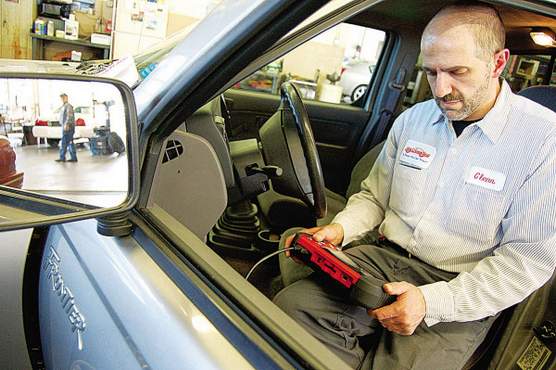 Sam Giammalvo's Auto Sales Service Manager, Glenn Giammalvo, checks the diagnostics of a Nissan Frontier pickup using a digital scan tool inside the New Bedford garage. ". . .In general, all the European manufacturers are bad, but
Volvo is the worst of the Europeans, many independent
garages have stopped working on Volvos and Mercedes. . ." -Glenn Giammalvo
". . .The biggest problem is that we get into a job and, when we
are halfway through, discover we don't have the information we need to complete
it. Then you have to decide if you will pay the manufacturer
for the information. You still might not get enough information to solve the
problem, but you've dug yourself deeper in debt on the job. . ." -Glenn Giammalvo |
The clerk at the parts counter was a friend, so he whispered a warning to Stan Morin. "You'll be back." He was right. Mr. Morin quickly learned that, even though he already had paid hundreds of dollars to get repair information and parts for a Volkswagen with a bad speedometer, he still had to shell out $150 to learn how to reprogram the vehicle's computer to get the car running again. Car companies might regret that sale: Mr. Morin has become a leader in the national movement to force them to share repair information. He says he learned most of what he knows about the effort right here in New Bedford. Mr. Morin, the general manager of New England Tire in Attleboro is the national treasurer of the Alliance of Automotive Service Providers and president of its Massachusetts chapter. The AASP is a national consumer group based in Boston that is pushing the Right to Repair Act, now in the U.S. Congress and also the state Legislature. The bill, if passed, will require car companies to provide independent repair shops access to all the diagnostic codes and repair information that it supplies to its dealers. "We are trying to protect the neighborhood repair shop," Mr. Morin said. "Local pharmacies have all gone out of business. Hardware stores have disappeared from neighborhoods. The local repair shop could be next. "That could happen if we don't get a fair shake." When he became aware of the problem, Mr. Morin said, he started to ask others in the car business what was going on. They referred him to Mark Giammalvo. "I've spent 20 years battling this issue, and the problem wasn't as bad when I started as it is now," Mr. Giammalvo said. "The problem is that manufacturers are holding back information from the after-market companies. "If we don't have access to that information, the independent operations have lost their competitive edge." The issue is critical now because almost everything in a modern car is controlled by a computer. Even the tires have modules that monitor tire pressure and send messages to the central computer. "On vehicles 1995 and newer, all our cars are performing all sorts of tests all the time, as you drive down the road," Mr. Giammalvo said. "The law mandates that we be able to diagnose all emissions related problems on a car and there is a universal connector for that. "But that doesn't include the airbags or the transmissions or the brakes or almost everything else. We get access to about 25 percent of the systems on the cars." Car companies offer repair and diagnostic information, but for a price. A number of after-market companies sell software programs that run diagnostic programs, but car manufacturers withhold some information. When mechanics need that, they have to buy access to it, for $30 to $150 a day. "The biggest problem is that we get into a job and, when we are halfway through, discover we don't have the information we need to complete it," said Glenn Giammalvo, who took over in the shop for his brother Mark. "Then you have to decide if you will pay the manufacturer for the information. You still might not get enough information to solve the problem, but you've dug yourself deeper in debt on the job. "People don't understand if you've spent their money and you can't fix their car. My job is to nip that in the bud and tell the customer to try the dealer. "That happens all the time. It must happen once a week for us." An independent mechanic could order the repair software from every car manufacturer. That would cost $40,704 for 2008 alone, Mark Giammalvo said. And that is still no guarantee of having all the information you need to complete a job, he said. The repair information provided to the dealerships often contains twice as much information as the programs offered to the public. "In general, all the European manufacturers are bad, but Volvo is the worst of the Europeans," Glenn Giammalvo said. Many independent garages have stopped working on Volvos and Mercedes, he added. Lawmakers are beginning to notice. City Councilor Brian Gomes sponsored a resolution that passed the council in March, calling on the state Legislature to adopt the Right to Repair bill. That bill, if passed, will require car manufacturers to share repair information. "I've heard from a lot of mechanics talking about a lack of access to the codes," Mr. Gomes said. "This bill is about looking after the small guy. The small guy is getting squeezed out everywhere." The laws under consideration in Boston and Washington would just level the playing field and let independent mechanics compete with the car dealers' garages, Mr. Gomes said. It made sense for the city to add its support to that, he added. "We don't want to see more local businesses closed down and more buildings boarded over," he said. "We want to support local businesses over corporate America." |